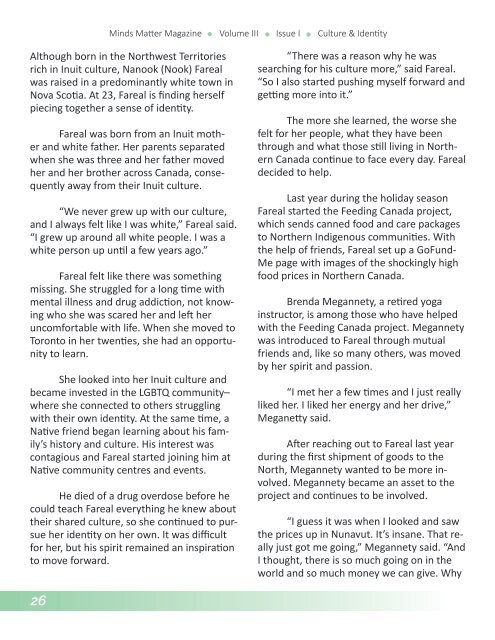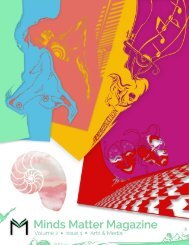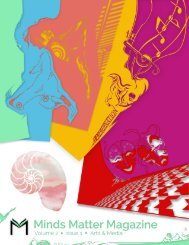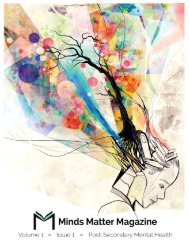Culture & Identity
Create successful ePaper yourself
Turn your PDF publications into a flip-book with our unique Google optimized e-Paper software.
Minds Matter Magazine Volume III Issue I <strong>Culture</strong> & <strong>Identity</strong> Minds Matter Magazine Volume III Issue I <strong>Culture</strong> & <strong>Identity</strong><br />
Although born in the Northwest Territories<br />
rich in Inuit culture, Nanook (Nook) Fareal<br />
was raised in a predominantly white town in<br />
Nova Scotia. At 23, Fareal is finding herself<br />
piecing together a sense of identity.<br />
Fareal was born from an Inuit mother<br />
and white father. Her parents separated<br />
when she was three and her father moved<br />
her and her brother across Canada, consequently<br />
away from their Inuit culture.<br />
“We never grew up with our culture,<br />
and I always felt like I was white,” Fareal said.<br />
“I grew up around all white people. I was a<br />
white person up until a few years ago.”<br />
Fareal felt like there was something<br />
missing. She struggled for a long time with<br />
mental illness and drug addiction, not knowing<br />
who she was scared her and left her<br />
uncomfortable with life. When she moved to<br />
Toronto in her twenties, she had an opportunity<br />
to learn.<br />
She looked into her Inuit culture and<br />
became invested in the LGBTQ community–<br />
where she connected to others struggling<br />
with their own identity. At the same time, a<br />
Native friend began learning about his family’s<br />
history and culture. His interest was<br />
contagious and Fareal started joining him at<br />
Native community centres and events.<br />
He died of a drug overdose before he<br />
could teach Fareal everything he knew about<br />
their shared culture, so she continued to pursue<br />
her identity on her own. It was difficult<br />
for her, but his spirit remained an inspiration<br />
to move forward.<br />
“There was a reason why he was<br />
searching for his culture more,” said Fareal.<br />
“So I also started pushing myself forward and<br />
getting more into it.”<br />
The more she learned, the worse she<br />
felt for her people, what they have been<br />
through and what those still living in Northern<br />
Canada continue to face every day. Fareal<br />
decided to help.<br />
Last year during the holiday season<br />
Fareal started the Feeding Canada project,<br />
which sends canned food and care packages<br />
to Northern Indigenous communities. With<br />
the help of friends, Fareal set up a GoFund-<br />
Me page with images of the shockingly high<br />
food prices in Northern Canada.<br />
Brenda Megannety, a retired yoga<br />
instructor, is among those who have helped<br />
with the Feeding Canada project. Megannety<br />
was introduced to Fareal through mutual<br />
friends and, like so many others, was moved<br />
by her spirit and passion.<br />
“I met her a few times and I just really<br />
liked her. I liked her energy and her drive,”<br />
Meganetty said.<br />
After reaching out to Fareal last year<br />
during the first shipment of goods to the<br />
North, Megannety wanted to be more involved.<br />
Megannety became an asset to the<br />
project and continues to be involved.<br />
“I guess it was when I looked and saw<br />
the prices up in Nunavut. It’s insane. That really<br />
just got me going,” Megannety said. “And<br />
I thought, there is so much going on in the<br />
world and so much money we can give. Why<br />
not just give them home? Why not give our<br />
own country?”<br />
When she was 22, Fareal reached out<br />
to her mother for the first time since the<br />
divorce. She learned her mother had been<br />
placed in a residential school as a young girl.<br />
This resonated with Fareal; suddenly she was<br />
personally involved and the horrific past of<br />
her people became too real.<br />
“Imagine all the abuse they went<br />
through. It just hit me really hard,” Fareal<br />
said, looking away as she recounted the time<br />
she learned about her mother’s past. “I felt<br />
so hopeless. I decided to start the project, I<br />
needed to help in some way.”<br />
After Feeding Canada’s first year, Fareal<br />
managed to send boxes to six different<br />
families and eight care packages to a food<br />
bank in Nunavut– with the highest food<br />
prices in Canada.<br />
Fareal has decided to expand the campaign<br />
in the next years. Wanting to involve<br />
more of herself and her own identity into her<br />
project, Fareal is beginning to plan an LGBTQ<br />
fashion show to fundraise for her cause. She<br />
wants to showcase LGBTQ designers from<br />
Canada and the U.S. and incorporate Native<br />
fashion designers as well.<br />
All of Feeding Canada’s donations go<br />
into the contents of the care packages and<br />
shipping costs. Fareal wants to do more to<br />
help entire communities and increase her<br />
success from six families.<br />
“I was thinking of using the money to<br />
go up there and give it to the hunters,” Fareal<br />
said thinking of the possibilities. “And then<br />
they’ll bring back the food and then they can<br />
feed their whole community.”<br />
The fundraising and project have<br />
helped Fareal learn about her culture and<br />
herself. Learning more about Native history<br />
has led Fareal to see what Indigenous people<br />
are capable of surviving– what she is capable<br />
of and what she can survive.<br />
“I feel like I’ve come a long way in the<br />
last couple years with finding my identity,”<br />
Fareal said smiling to herself. “Although, I<br />
know it’s a long process.”<br />
26<br />
27






